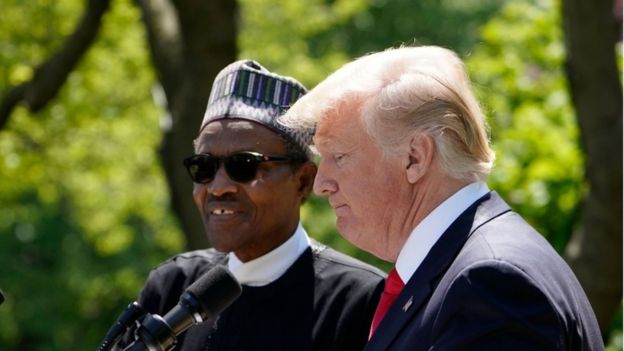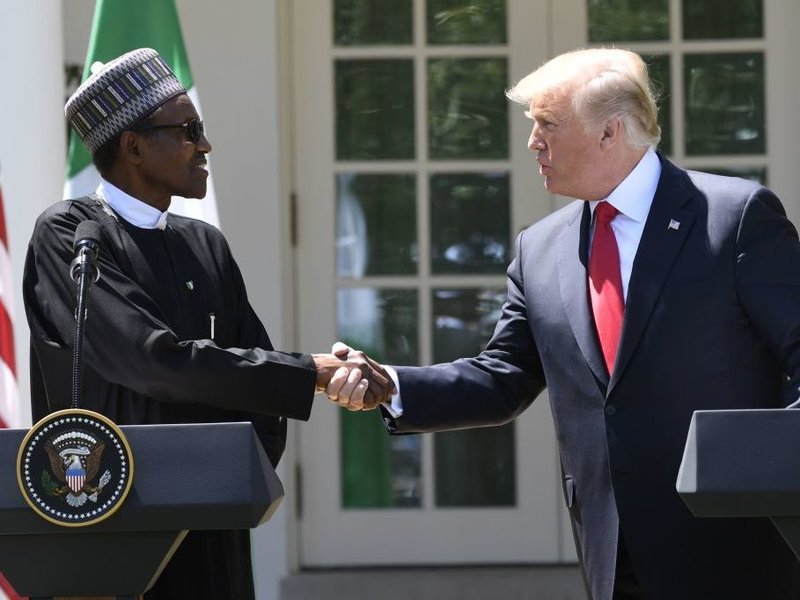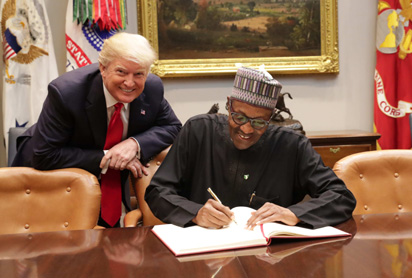President Trump hosts Nigeria’s president Buhari at the White House

BY JIBRIL TURE
President Donald Trump today hosted the president of Nigeria, Muhammadu Buhari, as his first African guest at the White House. The much-anticipated meeting, which came barely three months after Trump’s offensive remarks about Africa that infuriated leaders across the continent, focused on security issues and economic relations between the two nations.
Today’s meeting, working lunch and joint press conference were the continuation of sorts of previous contacts between the two leaders. Buhari was among the dozen African heads of state Trump hosted in New York during a luncheon in September in the context of the U.N. General Assembly. The Nigerian leader was also among the first world leaders, along with his then-South African counterpart, Trump spoke to over the phone not long after coming to the White House.
According to the President’s Readouts, Trump spoke with Buhari on 15 February 2017, a conversation during which
“The leaders agreed to continue close coordination and cooperation in the fight against terrorism in Nigeria and worldwide. President Trump expressed support for the sale of aircraft from the United States to support Nigeria’s fight against Boko Haram.”
As a result, the White House recently sold 12 counter-insurgency aircraft worth $496m to Nigeria to help in its fight against Boko Haram.

In addressing the press after the bilateral meeting today, Buhari said:
“We are grateful to the United States for agreeing to give us the aircraft we asked for… We are even more grateful for the physical presence of the United States military.”
One of Buhari’s pledges during the campaign that led to his election in 2015 was the total destruction of the Boko Haram insurgent group, which hasn’t quite materialized. After recalling the terrorist group’s pledge of allegiance to ISIS, Buhari–who plans to seek re-election next year–today thanked the United States for its fight against worldwide terrorism, noting that ISIS is now a thing of the past.
Economics was another major issue of discussion, Nigeria being Africa’s most populous country with 200 million people, the continent’s largest economy and its largest crude oil exporter.
In an effort to boost its economy, with an approach that borders on protectionism, Nigeria has banned the import of agricultural products. To which Trump said he hoped Nigeria would remove trade barriers to allow imports of American agricultural produce.
According to several Nigerian newspapers, a group of Nigerian government officials traveled to the United States ahead of the president’s arrival and has signed an agreement with four U.S. companies under the umbrella of General Electric to secure an estimated $2-billion investment to modernize crucial railways between Lagos and the northern city of Kano, and between Port Harcourt in the oil-rich Niger Delta and the northern city of Maiduguri. The officials are also poised to seek financing arrangements with U.S. financial institutions including the Export-Import Bank and the U.S. Overseas Private Investment Corporation.

Trump’s offensive remarks earlier in the year when he referred to African nations using vulgar language came up during the presidents’ newsconference. “We didn’t discuss it,” said Trump, without denying he made the said statement. Trump elaborated:
“You do have some countries that are in very bad shape. We didn’t discuss it because the president knows me and knows where I’m coming from.”
In his reply to a reporter’s question about how he felt about the statement, Buhari went diplomatic by answering:
“I’m very careful with what the press says about [people] other than myself, I’m not sure about the validity or whether that allegation against the president was true or not, the best thing for me is to keep quiet.”
Asked by a Nigerian reporter when he would visit Nigeria, Trump resorted to what he does best: demagoguery:
“Well I would like very much to visit Nigeria, […] It is an amazing country. In certain ways, I hear from the standpoint of the beauty of a country—there’s no country more beautiful.”


